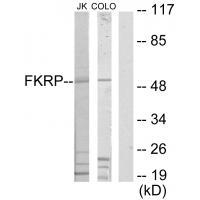
| WB | 1/500-1/3000 | Human,Mouse,Rat |
| IF | 咨询技术 | Human,Mouse,Rat |
| IHC | 咨询技术 | Human,Mouse,Rat |
| ICC | 技术咨询 | Human,Mouse,Rat |
| FCM | 咨询技术 | Human,Mouse,Rat |
| Elisa | 咨询技术 | Human,Mouse,Rat |
| Aliases | Fukutin-related protein; EC 2.-.-.-; FKRP; |
| Entrez GeneID | 79147; |
| WB Predicted band size | 50kDa |
| Host/Isotype | Rabbit IgG |
| Antibody Type | Primary antibody |
| Storage | Store at 4°C short term. Aliquot and store at -20°C long term. Avoid freeze/thaw cycles. |
| Species Reactivity | Human,Mouse,Rat |
| Immunogen | Synthesized peptide derived from N-terminal of human FKRP. |
| Formulation | Purified antibody in PBS with 0.05% sodium azide. |
+ +
以下是3篇与FKRP抗体相关的文献及其摘要概括:
---
1. **文献名称**: *Mutations in the fukutin-related protein gene (FKRP) cause a form of congenital muscular dystrophy with secondary laminin alpha2 deficiency and abnormal glycosylation of alpha-dystroglycan*
**作者**: Brockington M. et al. (2001)
**摘要**: 本研究首次发现FKRP基因突变与先天性肌营养不良相关。通过免疫组织化学和Western blot分析,使用FKRP特异性抗体发现患者肌肉组织中α-dystroglycan糖基化异常,并伴随层粘连蛋白α2缺乏,揭示了FKRP在维持肌细胞外基质完整性中的关键作用。
---
2. **文献名称**: *Localization of fukutin-related protein in the Golgi apparatus and its functional association with glycosylation pathways*
**作者**: Esapa C.T. et al. (2003)
**摘要**: 作者利用抗FKRP抗体进行免疫荧光染色,证明FKRP蛋白主要定位于高尔基体,并通过共聚焦显微镜观察其与糖基转移酶的共定位。研究提示FKRP参与调控α-dystroglycan的O-糖基化过程,为理解其病理机制提供了亚细胞层面的证据。
---
3. **文献名称**: *FKRP antibody validation for diagnosis of dystroglycanopathies in clinical practice*
**作者**: Brown S.C. et al. (2005)
**摘要**: 该研究系统评估了FKRP抗体在临床肌肉活检诊断中的应用。通过对比正常与患者肌肉样本的Western blot及免疫组化结果,证实抗体特异性,并建立基于FKRP表达水平的诊断标准,为肌营养不良的精准分型提供依据。
---
以上文献均聚焦于FKRP蛋白的功能研究或临床诊断,抗体技术(如Western blot、免疫组化)在揭示其生物学作用及疾病机制中发挥了关键作用。
The FKRP (Fukutin-Related Protein) antibody is a crucial tool in studying the FKRP protein, a glycosyltransferase involved in post-translational modification of α-dystroglycan, a key component of the dystrophin-glycoprotein complex. FKRP catalyzes the transfer of ribitol phosphate to α-dystroglycan, essential for its functional maturation and muscle membrane stability. Mutations in the *FKRP* gene disrupt this glycosylation, leading to a spectrum of muscular dystrophies, including congenital muscular dystrophy type 1C (MDC1C), limb-girdle muscular dystrophy type 2I (LGMD2I), and severe disorders like Walker-Warburg syndrome or muscle-eye-brain disease, often with brain and eye abnormalities.
FKRP antibodies are widely used in research and diagnostics to detect FKRP expression levels, localization, and glycosylation status in tissues (e.g., muscle biopsies) or cell models. They help elucidate disease mechanisms, correlate genotype-phenotype relationships, and assess therapeutic interventions, such as gene therapy or read-through compounds aiming to restore functional α-dystroglycan. Commercial antibodies target specific epitopes, but validation is critical due to potential cross-reactivity or variability in glycosylation-dependent epitope availability. Ongoing research focuses on refining antibody specificity and developing novel biomarkers to improve diagnostic accuracy and monitor treatment efficacy in FKRP-related disorders.
×